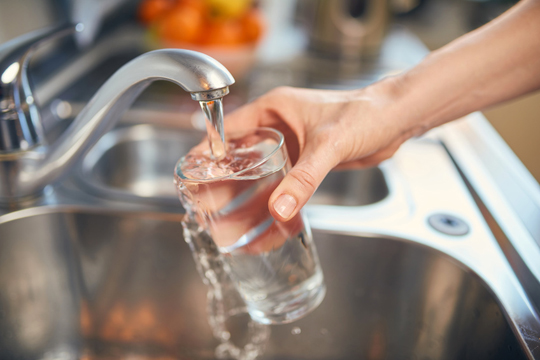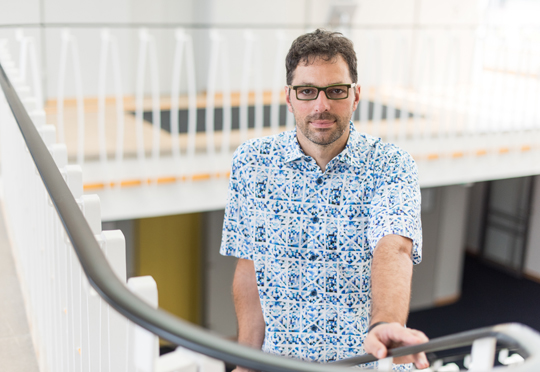Cold, clear water
Freiburg, Mar 20, 2018
For the past 25 years, the World Water Day has taken place annually on March 22. For this occasion, the University, water authorities, industry and the municipal drinking water supply companies are hosting a public colloquium in the SWR studio on March 20, 2018. In anticipation of the event, Jürgen Reuß sat down for a chat with hydrologist Prof. Dr. Markus Weiler from the University of Freiburg to ask him about the quality of Freiburg’s drinking water.

Markus Weiler advises all Freiburg city dwellers to forego lugging water crates and to drink tap water instead. Photo: samopauser/Fotolia
Dr. Weiler, what does World Water Day mean for a hydrologist?
Markus Weiler: In such a highly developed country such as Germany, most people take for granted the fact that you only have to turn on the tap at home to get immediate high-quality drinking water. But the process is not as self-evident as you might think. For that reason we use this day in Freiburg as an opportunity to broadly publicize the significance of water as an essential natural resource. Anyone who is aware of how much effort it takes to provide the water’s basic supply will also learn to appreciate this resource and promote its preservation and quality.
Should we be worried about Freiburg’s water quality at the moment? We’ve been hearing a lot lately about glyphosate and other pesticides.
We don’t need to be worried about that for our drinking water. The quality is excellent. But because we are aware of the topic’s current significance, we have made the question as to whether pesticides are endangering the quality of our drinking water the focal point of this year’s World Water Day event.
In your opinion, are glyphosate and other pesticides harmless?
No, you can’t make that generalization. But in Freiburg, our drinking water originates from the groundwater and, based on its properties, glyphosate doesn’t reach it as frequently. On the other hand, it can be washed off the surface and enter into streams. We have to keep an eye on this issue in places where the drinking water comes from the Rhine and possibly think about how to remove the toxins there. From a technical standpoint, it wouldn’t be a problem should that moment come.
Shouldn’t we use a household filter for the water tap or drink mineral water instead?
That’s nonsense. The regulations and thresholds are generally stricter for drinking water than for mineral water. If you're just afraid of pollutants, save yourself from having to carry heavy water crates up the stairs. And for carbonation, we also have cartridges with carbon dioxide.

"Where do I have to protect more, where can I use the land more intensively?": Markus Weiler advocates differentiated land use. Photo: Patrick Seeger
Then everything is alright with our water.
That’s a rather simplified view. The current quality of drinking water from the tap is just one aspect. We also have to look toward future developments. For instance, it is obvious that agricultural pesticides have become indispensible. These agents or their degradation products accumulate in the environment. At present, a lower level of fertilization is required in agriculture because we have noted a slow accumulation of nitrates in the groundwater.
Would a switch to ecological agriculture be a solution?
It is not as simple as that, especially if we do not want to forego secured crop yields and profitability. In practice, the situation is usually much more complex and requires more than just black-and-white thinking. For example, glyphosate is often used where, for ecological reasons, land is no longer plowed to protect steep fields from erosion.
How would you combine the needs of agriculture with the desire for living waters?
As a hydrologist, I am between a rock and a hard place. I view some chemicals as dangerous. Especially since rapidly degradable substances, which have been developed in order to minimize the effects on the water cycle, are problematic: Degradable does not mean that these substances disappear. They are often merely transformed, make new connections, and become so-called metabolites that may not be less problematic. On the other hand, I also see the benefit if the substances were to be completely degradable.
How can we circumvent this dilemma?
In the future we will no longer say that we can apply this substance everywhere or that method of cultivation is the best in every situation. We have to improve our environmental spaces structurally in order to be able to say that we will allow this here and not there. Instead of stubbornly adhering to the traditional definition of land use, it would be better to include additional aspects such as respective hydrological conditions and then decide: where should I protect more, where can I make use substances more intensely?
How could we implement it from a practical perspective?
For example, the City of Munich has bought up all the land that is relevant for its water supply and has now leased it to the agricultural sector under certain conditions. In this sense, it would be desirable if we had catchment areas for which we could identify particularly sensitive areas where one should think very carefully about what substances may be registered there because they land in the water to a large extent. In return, you could then release less problematic areas for intensive use.

